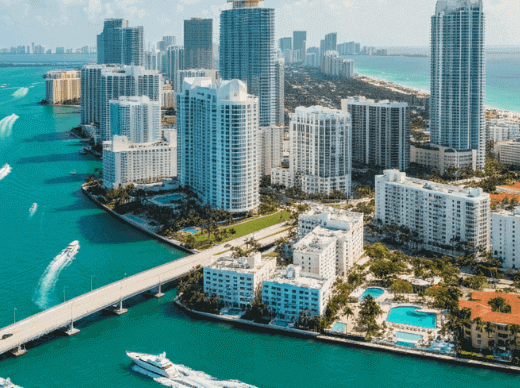Selling your land in Miami can be a highly profitable move, especially with the region’s continuous population growth driving constant demand for new development projects. However, a successful sale involves more than just finding a buyer; it requires understanding what developers need, like favorable zoning, utility access, and adequate frontage for their plans. Many landowners make the mistake of not having a clear entitlement path or realistic price comparisons, which can delay or sink a deal. To successfully sell land to a developer in Miami, Florida, you must prepare your property’s documentation and know its maximum potential value. Steve Daria and Joleigh, experienced real estate investors and cash land buyers, specialize in making fast and simple transactions. They can bypass the typical hurdles of financing and entitlements, making the process smoother for sellers. If you want to learn how to sell land to a developer in Miami, Florida, efficiently, book a free discussion with our team today to explore a direct cash offer.
What do developers look for when buying land in Miami, Florida?
Developers in Miami look for several key factors when considering a land purchase.
The most crucial factor is favorable zoning, which allows for high-density residential or commercial projects and determines their potential return on investment.
They also need a prime location with easy access to major roads and public transit, along with available utilities like water, sewer, and power at the site.

The parcel’s size, shape, and road frontage must be suitable for a large-scale build, and they often prefer land with potential to be combined with adjacent lots.
Before making an offer, developers conduct thorough checks for environmental issues, soil quality, and flood zone status to avoid costly surprises.
They heavily favor properties with a clear or already-completed entitlement process, as this drastically reduces their risk and timeline.
A developer’s interest is ultimately driven by market demand and their ability to exit the project for a profit successfully.
To successfully sell land to a developer in Miami, Florida, you must be prepared with a realistic price, a clean title, and a recent survey.
Get Started: Get Your Cash Offer Below…
We are direct land buyers. There are no commissions or fees and no obligation whatsoever. Start below by sharing where your property is and where we can send your offer…
How does Miami’s market demand impact my land’s price?
Miami’s strong market demand directly increases the value of your land by creating intense competition among developers.
As population growth, job creation, and migration fuel the need for more housing and commercial space, developers become more eager to acquire suitable parcels.
This high demand allows them to pay more, especially for properties in prime locations with favorable zoning and existing utility access.
However, factors like rising interest rates and high construction costs can limit what a developer is willing to offer, even in a hot market.
Parcels in desirable submarkets often receive multiple bids, driving up the final sales price and shortening transaction timelines.
Conversely, properties located in flood-prone areas or with development constraints may not experience the same level of price appreciation.
Understanding these dynamics is crucial when you sell land to a developer in Miami, Florida.
To set realistic expectations, you should actively track local zoning changes, comparable sales, and new projects in your area.
What happens during a developer’s due diligence period in Miami, Florida?
- Title Search and Survey: The developer orders a title search to ensure clear title and avoid project delays. They also commission a new ALTA survey to confirm exact boundary lines, easements, and any physical encroachments on the land.
- Environmental and Soil Testing: A Phase I Environmental Site Assessment is conducted to check for any past contamination, which is crucial for securing financing and permits. Geotechnical engineers also perform soil tests to determine its stability and capacity to support a large structure, while also verifying its flood zone designation.
- Zoning and Entitlement Verification: The developer’s legal team will thoroughly review Miami-Dade’s zoning codes to confirm what can be built, including density, height, and setback requirements. They will also map out the entire entitlement process to estimate the timeline and likelihood of gaining all necessary government approvals.
- Utility and Infrastructure Review: The developer confirms the location and capacity of essential utilities like water, sewer, electrical power, and fiber optics. They verify with local authorities that the existing infrastructure can handle the demands of their proposed project or calculate the high cost of extending services to the site.
- Financial Feasibility Analysis: Finally, the developer builds a detailed financial model to project the total cost, including construction, against potential revenue from sales or rent. This pro-forma analysis determines if the project will be profitable enough to justify the land purchase price and associated risks.

What if my land doesn’t have direct access to water and sewer lines?
Lacking direct access to water and sewer lines can significantly complicate a land sale, but it doesn’t always make it impossible.
A developer will immediately hire engineers to determine the cost and feasibility of extending municipal utilities to your property.
This process involves calculating the distance to the nearest connection points, securing necessary easements from neighbors, and estimating high-cost items like connection fees or lift stations.
While septic systems and wells are sometimes alternatives, Miami-Dade County has strict health and environmental regulations that often limit their use for large-scale projects.
These extension costs will be directly subtracted from the developer’s offer, lowering the price you receive for the land.
The complexity of off-site work not only extends timelines, but also makes it harder for developers to secure project financing.
Understanding these potential costs is essential if you want to successfully sell land to a developer in Miami, Florida.
Before listing your property, contact the local water and sewer department to get capacity maps and a written estimate for extending services, which will help you set a realistic price.
How should I negotiate the price and terms with a developer in Miami, Florida?
- Focus on Your Net Proceeds, Not Just the Offer Price: A higher offer with large closing cost contributions or other seller fees might leave you with less money than a slightly lower, cleaner offer. Always calculate your final take-home amount after all expenses to compare offers accurately.
- Shorten Timelines and Limit Extensions: Negotiate for the shortest possible due diligence and entitlement periods to prevent a developer from tying up your land indefinitely. You can also make any extension requests contingent on an additional non-refundable deposit.
- Tighten Contingencies and Require “Hard” Money: Push for specific, achievable contingency goals and require a meaningful, non-refundable deposit once the initial inspection period is over. This ensures the developer has “skin in the game” and is serious about closing the deal.
- Justify Your Price with Data: Approach negotiations with more than just an asking price; prepare comparable land sales and a basic residual land value calculation. This demonstrates to the developer that your pricing is based on the property’s actual financial potential for their project.
- Trade a Higher Price for Greater Certainty: A non-contingent, all-cash offer that can close quickly is often more valuable than a higher, riskier offer that depends on financing and entitlements. Keeping backup buyers engaged also gives you leverage to demand better terms from your primary offer.
How long does it typically take to close a land sale with a developer?
The timeline to close a land sale with a developer can vary dramatically depending on the offer’s terms.
A straightforward cash purchase with minimal contingencies might close in as little as 30 to 45 days.
However, a more complex deal that is contingent on financing or securing government approvals can take much longer.
The due diligence period, which includes environmental reports, new surveys, and title searches, often adds weeks or months to the process.
If you need to sell land to a developer in Miami, Florida, the longest delays usually come from waiting for zoning changes or entitlement approvals, which can extend the closing timeline to a year or more.
Expert and seasoned real estate investors Steve Daria and Joleigh are cash land buyers who can eliminate these uncertainties.
Because they buy with their own funds, they can bypass lengthy financing and appraisal hurdles, often closing on your schedule with fewer contingencies.
To explore a faster and more direct sales process, book a free discussion with our team today.
Takeaway
- Understand Zoning and Land Use Regulations: Before approaching developers, ensure you understand your land’s zoning. Miami has specific regulations that impact what can be built, which directly affects your land’s value and buyer interest.
- Get a Professional Land Valuation: Work with a local appraiser or land expert to determine the fair market value. Developers base offers on factors like location, size, access to utilities, and potential return on investment, so accurate pricing is crucial.
- Prepare Key Documentation Early: Gather property deeds, surveys, environmental reports, and title history. Having these ready makes the transaction smoother and gives developers confidence in your property’s legitimacy and potential.
- Market Directly to Developers: Identify active developers in the Miami area who specialize in your specific land type. Direct outreach through real estate agents or networking can attract serious buyers faster than listing publicly.
- Be Ready to Negotiate Terms: Developers may request feasibility studies or rezoning before closing. Always stay flexible and informed, and consider hiring a real estate attorney for protection during negotiations.
**NOTICE: Please note that the content presented in this post is intended solely for informational and educational purposes. It should not be construed as legal or financial advice or relied upon as a replacement for consultation with a qualified attorney or CPA. For specific guidance on legal or financial matters, readers are encouraged to seek professional assistance from an attorney, CPA, or other appropriate professional regarding the subject matter.
